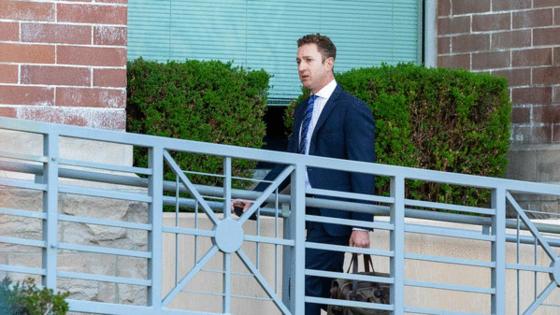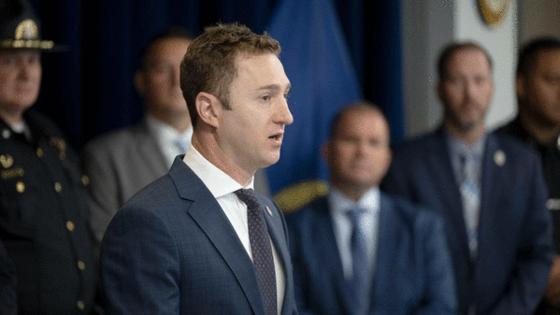Former US attorney for Idaho defends plea deal in Kohberger case
Published in News & Features
BOISE, Idaho — Debate over a plea agreement for Bryan Kohberger in the University of Idaho student murder case should not overshadow crack police work and a prosecution that had the defendant admit guilt, former U.S. Attorney for Idaho Josh Hurwit said in an interview with the Idaho Statesman.
In his first comments about the case since the court’s gag order was lifted, Hurwit — who later joined the Kohberger prosecution team — sought to remind the public that solving the quadruple homicide and bringing the killer to justice was never a given.
“Let’s not forget there was no guarantee at the outset that anyone would be held accountable … if we could find this person,” he said. “And then to actually do it in a way that allowed successful prosecution — and it was a successful prosecution, because there were convictions that will not be appealed.”
Kohberger, 30, was sentenced Wednesday to four consecutive life sentences, plus 10 years for felony burglary, as part of a plea agreement reached earlier this month to avoid the death penalty. In addition to waiving his appeals, Kohberger also won’t be eligible for parole as part of the plea deal. Kohberger admitted guilt to the five charges, including four counts of first-degree murder in the students’ fatal stabbings in November 2022.
The victims were U of I seniors Madison Mogen and Kaylee Goncalves, both 21; junior Xana Kernodle, 20; and freshman Ethan Chapin, 20. The three women lived in a rental house on King Road in Moscow near campus with two other female roommates who went physically unharmed in the attack. Chapin was Kernodle’s boyfriend and stayed over for the night.
Hippler lifted the court’s gag order in the case last week, but members of the prosecution, led by Latah County Prosecutor Bill Thompson, declined to speak about the case until after Kohberger was sentenced Wednesday. Kohberger’s defense attorneys issued a statement that they will not comment at all, and cited ethical obligations to require their client’s consent to release information under the Idaho State Bar rules of professional conduct.
Hurwit was appointed by former Democratic President Joe Biden to his prior role as Idaho’s lead federal prosecutor and confirmed in 2022. As Republican President Donald Trump returned to office, Hurwit transitioned out as U.S. attorney for Idaho in February and then joined the Kohberger prosecution team after Thompson asked him to do so, he told the Statesman.
“For me, it was important to pursue justice in this way,” Hurwit said. “It was an opportunity to serve and do work that was really important for our state, and for that community.”
But Hurwit, as Idaho’s U.S. attorney, was involved in the U of I student homicide case almost from the get-go.
He was quickly informed of the deaths, he said, and attended a vigil the university hosted at the Kibbie Dome in Moscow two and a half weeks later. At that time, no suspects had been identified, which left students and residents of the small town in a “very challenging” and “traumatic” situation, Hurwit said.
“The community was shocked, grieving, but also scared,” he said. “And there was uncertainty about what had happened, who had done this, was there any other danger at that point? So it was a very dark period for Moscow.”
Hurwit acknowledged that he was consulted on some of the FBI’s investigative efforts in the closely watched case, which included use of investigative genetic genealogy, or IGG, to arrive at Kohberger as the suspect. The advanced policing technique involves submitting crime-scene DNA to public ancestry databases to narrow down the list of possible culprits. But Hurwit declined to address any specifics, citing confidential federal tactics.
On Dec. 19, 2022, the FBI sent along Kohberger’s name to local law enforcement, according to court records. Hurwit was kept in the loop about that, as well as the arrest operation later planned for the early morning of Dec. 30 in eastern Pennsylvania, he said.
“As the investigation unfolded, I was aware of how things were progressing,” Hurwit said.
Arresting Kohberger took about seven weeks. Investigators worked tirelessly to catch the killer as quickly as possible, Hurwit said.
“It was the time required and needed to do the right type of investigation, to do it the right way. I’m confident in law enforcement that there were no delays,” he said. “People were working — I know this — literally around the clock when, in a case like this, it took the time it took, and what matters ultimately is the way the person was held accountable.”
Could federal charges be coming?
Victims’ families were torn on the plea deal that allowed Kohberger to bypass a trial and possible death sentence. The parents and siblings of Kaylee Goncalves, who were vocal about their hopes for capital punishment, have voiced ongoing frustrations that their wishes were not followed by prosecutors.
“Thompson robbed us of our day in court,” the Goncalveses posted on a dedicated family Facebook page. “No negotiations, no jury of our peers, not even the pretense of cooperation and fairness.”
Thompson told reporters Wednesday after Kohberger’s sentencing that he understands not everyone agreed with his decision to accept a plea deal, but that comes with the territory of his position. And he accepts the responsibility.
The Goncalves family also sought information about Kohberger’s motives, and details about their loved one’s death, which they said they expected to learn with a trial.
President Donald Trump weighed in similarly this week, suggesting in a social media post that 4th Judicial District Judge Steven Hippler, who accepted Kohberger’s guilty pleas earlier this month, should require an explanation from the defendant at sentencing. Under state and federal law, though, a defendant can’t be compelled to speak and has the right to remain silent. Kohberger declined a chance to speak at his sentencing Wednesday.
Trump’s comment raised questions about whether a separate federal investigation and charges could develop against Kohberger. Although Kohberger avoided capital punishment in Idaho through his plea bargain, the prospect could still exist with the federal death penalty.
Hurwit declined to answer whether federal charges were possible and directed the Statesman to his former office. Mackenzie Nyland, spokesperson for the U.S. Attorney’s Office for the District of Idaho, said in an email that U.S. Department of Justice policy does not allow their office to confirm or deny the existence of any investigation. The FBI did not address the matter in its brief statement after the sentencing.
Though federal charges for Kohberger might be possible under the right circumstances, Atlanta-based criminal defense attorney Molly Parmer, who has experience in the federal court system, told the Statesman that it is “very unlikely,” from her analysis.
“The U.S. Attorney’s Office would need to decide whether the prosecution would serve a substantial federal interest,” she said in an email. “Obviously it would not make sense, in terms of economics or resources, to bring a federal prosecution against a defendant already serving life without parole, unless the federal death penalty is on the table.”
Federal law also makes bringing a murder charge easier when the deaths involve a firearm, Parmer said, rather than a knife, as in this case. Plus, prosecutors would need to establish federal jurisdiction, she said.
“Since there is no apparent federal jurisdiction for the murder, I don’t see how they bring the death penalty,” Parmer said. “There are certainly other federal crimes a U.S. attorney could charge, but none that are death-eligible that I see.”
Public scrutinizes Kohberger prosecution
The state prosecution, overseen by Thompson, has continued to face public scrutiny over the decision to reach a plea deal with Kohberger, rather than take the capital murder case to trial.
“I joined this case to seek justice and to do what I thought was the right thing, and Bill hired me,” Hurwit said. “And I joined the case under 100% expectation that we would be going to trial and be seeking the death penalty, and we would do everything we possibly, humanly could to get those results. I had no hesitation for this one.”
But within days of Hippler denying the defense’s request to delay the trial, Kohberger’s attorneys contacted prosecutors to see if a deal could be negotiated for their client, Thompson wrote in a letter to the victims’ families, obtained by the Statesman. Suddenly, the prospects of the long-awaited trial changed, with Kohberger agreeing to plead guilty to all charges. He’ll now spend the rest of his life in prison.
Hurwit said the prosecution “poured our heart and souls into this case” from the start to ensure justice was done. At Kohberger’s plea hearing, Thompson even became emotional as he wrapped up the state’s narrative of what transpired that early Sunday morning.
“I know Bill and his team — despite what some people might say — dedicated every waking hour of their lives to this case since it happened, and they had to do that within the constraints of what it means to be a prosecutor,” Hurwit said. “And Bill cares about the victims, he cares about their families, he cares about his broader community. And it was just a very emotional and huge moment in anyone’s career to have this result, after all the uncertainty from the very beginning.”
_____
©2025 The Idaho Statesman. Visit idahostatesman.com. Distributed by Tribune Content Agency, LLC.










Comments